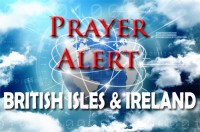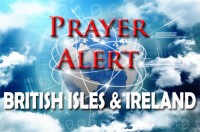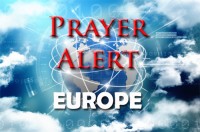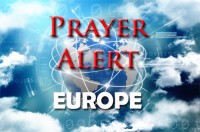Scotland: pray blessing and healing
The Pray for Scotland newsletter reminds us to focus on seeking God’s perspective on what is happening to and within the UK, ignoring media chatter, and to ‘be still’ and hear from the One who holds the destiny and future of nations in His hands. We must keep praying for God to bless our Government as it enters the uncharted waters of Brexit. Pray for a time of calm reflection, and above all pray for God to heal the divisions there undoubtedly are in Scotland and throughout the UK. Psalm 60:2 reads, ‘You have shaken the land and torn it open; mend its fractures, for it is quaking’. So we need to pray that Father God will indeed ‘seal the cracks’ in whatever way he chooses to make that happen. Some politicians may have to change their attitudes to one of greater co-operation for the good of the nation - whatever it takes.
Queen's Speech on 21 June
Theresa May is pressing ahead with holding a Queen’s Speech to set out her plans for government, while negotiations continue with the Democratic Unionist Party about the nature of its support for her minority government. A senior Conservative source said that there was broad agreement with the DUP on the principles of the Queen's speech, but there is as yet no formal ‘confidence and supply’ deal which would tie the DUP into backing the government on key pieces of legislation. The four areas of agreement are strengthening the union; combating terrorism; delivering Brexit; and delivering prosperity across the whole country. However, some aspects of the Conservative manifesto, including scrapping free school lunches, expanding grammar schools, and means-testing winter fuel allowance for pensioners appear unlikely to be included.
German media: a soft Brexit ?
Senior figures in Europe have been pondering how the result of Theresa May’s election gamble will affect the Brexit negotiations. The newspaper Frankfurter Allgemeine Sonntagszeitung said that the European Commission views the election result as a sign that most Brits don’t desire a ‘hard exit’ from the EU. The European Commissioner, Günther Oettinger, has reportedly said that it may now be possible to discuss ‘closer relations’ between the UK and the EU than Mrs May had originally planned. However Wycombe MP Steve Baker, a committed Christian and one of the most vocal Eurosceptic Tory MPs, was moved in the cabinet reshuffle to an important role in the Brexit department. The choice of Mr Baker is likely to anger those hoping the election result would force Mrs May to adopt a more conciliatory tone on Brexit and drop threats to leave the EU without a trade deal. See also
Brexit negotiations: who to pray for
EU institutions playing a significant role in the Brexit negotiations are: a) the European Council,which defines the general political direction and priorities of the EU and consists of the heads of state or government of member states, together with the President of the European Commission. b) the Council of the EU, which represents member states' governments. That is where ministers from EU countries meet to adopt laws and coordinate policies. They play a key role in negotiating and approving EU legislation and international agreements; c) the European Commission, the only institution with the authority to initiate legislation in most areas. It draws on input from a variety of other bodies; d) the European Parliament, comprising 751 MEPs elected by citizens of the 28 member states. Its role is to scrutinise, amend and vote on legislation.











